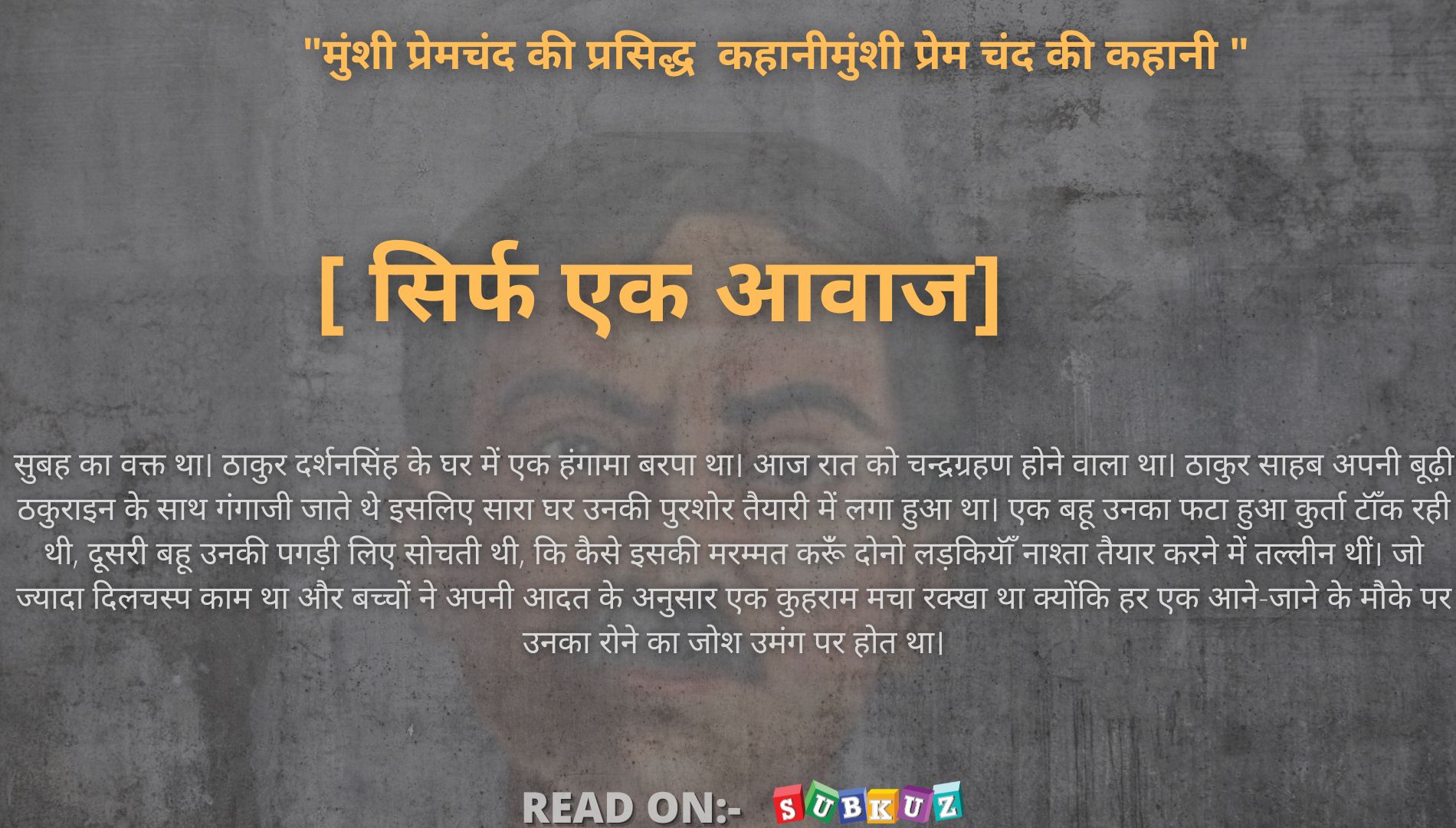Friends, our country has been a cradle of great men and women throughout the ages, from sages and poets to writers and musicians. The countless creations of these luminaries are invaluable treasures. Today's youth, immersed in the digital age, seem to be losing touch with this legacy and the invaluable wealth of our heritage. Subkuz.com strives to bring you not only these precious treasures, but also entertaining stories, news, and information from around the world. Presented here is a remarkable and inspiring story by the renowned writer, Munshi Premchand.
A Single Voice
It was early morning. A flurry of activity reigned in Thakur Darshan Singh's household. A solar eclipse was imminent that night, and the Thakur, along with his elderly wife, was undertaking a pilgrimage to the Ganges. The entire household was consumed with their preparations. One daughter-in-law was mending a torn kurta, another pondering how to repair a tattered turban; both daughters were diligently preparing breakfast. As usual, the children were creating a commotion, their cries erupting at every turn and for every perceived slight.
As the time for departure drew near, some cried at the prospect of leaving home; others, upon returning, lamented the imbalance of their day. The elderly Thakurani soothed the children and advised her daughters, "Be cautious! Do not venture outside until the eclipse is over. Avoid touching sickles, knives, or axes. Understand my words, heed my warnings; your well-being is my concern. Do not let a drop of water touch your lips. Adversity has befallen the house of Narayan. Do not turn away any sadhu or beggar who comes to your door." The daughters, however, were preoccupied with escaping the impending disruption and the anticipated celebration of the spring season's arrival. They longed for singing and music.
Though old, Thakur Sahib's spirit was undeterred by age. He cherished the tradition of bathing in the Ganges during an eclipse, seeing it as a sacred duty. His knowledge was legendary; he could predict solar and lunar eclipses and festivals months in advance, simply by reading the celestial charts. His reputation among the villagers was second to none, perhaps even surpassing that of the local scholars. His youthful service in the army had instilled a formidable aura, making him a figure of respect and authority. Any messenger approaching him with official documents encountered a seasoned pragmatism, an experience unmatched for miles around. He remained a leader in matters of fortitude and resolve. His words could inspire others with their confidence and unwavering determination. His pronouncements were commanding, resonating with the force of a lion's roar whenever villagers reached an impasse. Even the local magistrate found himself respecting the Thakur's ability to engage in direct discourse. He was a formidable debater, often standing against local scholars and pundits in lively intellectual exchanges.
As midday approached, the Thakurani and her entourage began their journey to the river. Thousands of villagers, a diverse and thronging multitude, were participating in this pilgrimage. Elderly men walked with canes, while others traveled in palanquins; some seemed almost beyond the assistance of mortality. The sight was a tapestry of human resilience, of faith in the face of physical limitations. Men carried their aged mothers on their backs. Some bore bundles of clothes, others vessels, and still others, walking sticks. The air was alive with the fervor of devotion. Regardless of their personal hardships, a palpable spiritual energy filled the community, making each face radiant and infectious with cheer. Women sang:
Lord of the heavens, Moon and Sun,
You shine as one, in time's domain,
The world is filled with your divine grace,
The sight seemed a river of people, converging from countless streams and rivulets, making their way towards the grand ocean.
When the pilgrims reached the Ganges, the third watch of the day had arrived. The banks of the sacred river were thronged with people, filling the available space. The majestic scene instilled an undeniable reverence and sense of devotion in all who beheld it. The multitude of faith-filled pilgrims, their faces uplifted, invoked blessings upon the sacred river; their voices rose in harmony, united in their devotion. The vast river, a vibrant expanse of azure, seemed to quench the thirst of the pious seekers. It held the promise of renewal for the weary and hopeless, a symbol of purity and divine grace, a refuge for the downtrodden. The Ganges, radiant and playful, seemed to rejoice, and to greet each devotee with an abundance of spiritual affection. Its appearance seemed to be a testament to the faith and reverence of its worshippers. Was this pride in the river's dignity, or the joyous embrace of her devoted followers? The Ganges' attire shone with the brilliance of countless stars reflecting in the water, and the edges of its garments were adorned with a myriad of vibrant, graceful flowers that moved with the river's current.
The eclipse was yet to begin, and people moved about. Vendors plied their wares; vendors engaged in lively banter. Others watched wrestling matches, or engaged in spirited discussions. Thakur Sahib, accompanied by some devout followers, sought solace in quiet contemplation, disinclined to participate in these mundane activities. He noticed a large pavilion filled with educated people. Thakur Sahib asked his companions to stand back while he approached, confident that these scholars would recognise his own keen intellect and deep knowledge.
A gathering of two thousand people listened attentively to a speaker. The most prestigious individuals occupied the front rows, enjoying the best views. Several people were visibly distressed by the proximity of less-privileged individuals. The speech was lengthy but did not generate much enthusiasm; it lacked the spark required for applause.







